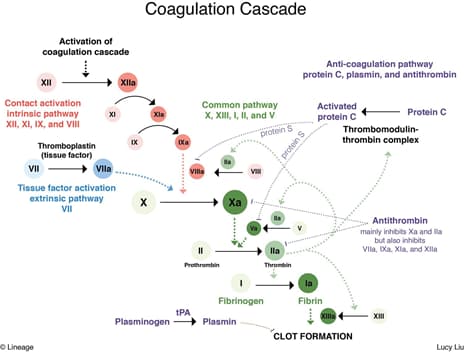Snapshot

- A 25-year-old Caucasian woman presents with her right calf larger than her left. She was recently started on oral contraceptive pills as birth control. She denies any long train rides or plane rides in the past few weeks. A dopper reveals a DVT in her right leg. She is started on LMWH. On further questioning, she reveals that she has had two spontaneous miscarriages. Her family history also includes multiple relatives with unprovoked DVTs.
Introduction

- Hypercoagulable state/thrombophilia from mutated factor V
- Genetics
- factor V Leiden mutation
- Mutation from Guanine to Adenine at nucleotide position 1691 (G1691A), which causes amino acid change from Arginine to Glutamine at amino acid position 506 (Arg506Gln)
- incomplete autosomal dominant
- Epidemiology
- most common cause of inherited hypercoagulable states
- most common in Caucasians
- Pathogenesis
- review of anticoagulation pathway
- protein C (with protein S as a co-factor) inactivates factors V and VIII
- review of anticoagulation pathway
- thrombosis
Presentation
- Symptoms
- recurrent DVTs
- DVTs beginning at a young age
- PE
Evaluation
- Diagnosis
- activated protein C resistance assay (factor V Leiden specific functional assay)
- if positive, confirm with DNA testing
- Normal PT/PTT
Differential Diagnosis
Treatment
- Antithrombolytics as needed with thrombosis
- LMWH bridge to warfarin
Prognosis, Prevention, and Complications
- Prognosis
- mortality not affected
- Prevention
- avoid external causes of hypercoagulability
- OCPs
- hormone replacement therapy
- avoid external causes of hypercoagulability
- Complications
- miscarriage
- thrombosis



